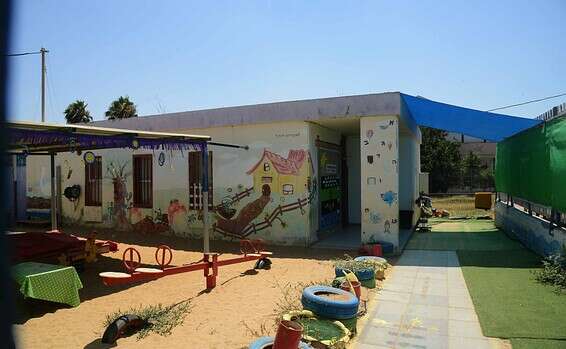The Ministry of Education is dragging its feet: Despite unequivocal recommendations from professionals, there is still no plan to allow return to kindergartens and lower grades in small groups • Parents: "Children are in uncertainty, on the verge of chaos in all respects"
Closed kindergarten // Photo: "Dudu Greenspan
Loss of advice: The Ministry of Education has not yet decided how to return the education system to the Corona routine at the end of the closure - despite the experts' recommendation for learning in capsules at all age groups, including kindergartens and first and second grades.
The Sukkot holiday will end this coming Sunday, so supposedly the students were supposed to return to the education system, but as long as the closure continues the education system will not open its gates and learning will remain online.
The big question is what will happen the day after - that is, the day when the students will have to return to the classrooms.
An official document from the Corona National Information and Knowledge Center for the Campaign states that kindergartens and grades 1-3 must first be returned to school and states that "their return to the frameworks must be carried out with strict adherence to capsules."
However, as stated, the Ministry of Education has not yet decided which age groups to return to learning after the end of the closure and in what form.
Moreover, the ministry also did not announce that they are preparing for learning in small groups (capsules) in kindergartens and first and second grades that so far, due to the recommendation of the Ministry of Health, have studied in regular, large and crowded classes.
This means that as the deployment begins later, there is a concern that the classrooms will not be ready in time.
This uncertainty affects the entire education system, students, parents, teachers and principals.
"The feeling is that there is no organized program," says S., a first-grade teacher at a school in the center of the country. "There is no priority, we hear about a lot of recommendations, every day there is a new report.
But someone from the education system who will say what they decided to do - we have not heard yet.
Someone who will come right now and say that they have decided to split the learning in the first grades, someone who will tell us to prepare for it, to make lists, that the authorities or the ministry will already start recruiting teams.
We are always waiting for the last minute - we do not know how we will return to school. "
Living in uncertainty
According to Sigal Spitz Toledano, chairman of the National Parents' Kindergarten Committee: "Living under uncertainty is unbearable and does not allow for stability in any way.
As long as there is a clear expectation of working parents to continue their work, from the office or from home, timelines and a clear expected plan must be given for the return of the lower classes, kindergartens and lower classes, children who cannot be left alone in their home.
Children, too, need stability and organization, perhaps even more than anyone else.
The children are in uncertainty, on the verge of chaos in every way.
"Obviously there is a dynamic in the morbidity data and it is difficult to plan, but those who have taken it upon themselves to lead and make difficult systemic decisions have to deal with the complexity."
The problem of gene splitting
The big problem expected for Education Minister Yoav Galant is the splitting of kindergartens.
There are about 20,000 kindergartens in Israel and about 18,000 kindergarten teachers - this means that in the event of a split, the education system will have to recruit a huge number of about 40,000 kindergarten teachers and assistants who will operate all the kindergartens without rotation.
This is a program with high costs, great preparation and manpower - but is a reality if you want to move the economy and get the parents to work.
At the moment, no one is talking about the return to fourth- and sixth-grade students, and the forecast for middle and high schools is even gloomier as the report states that “their return to frontal studies should be carefully considered in the near future.
And you have to make sure that you are prepared and ready for online studies only, for a long period of time - long weeks and possibly months. "

